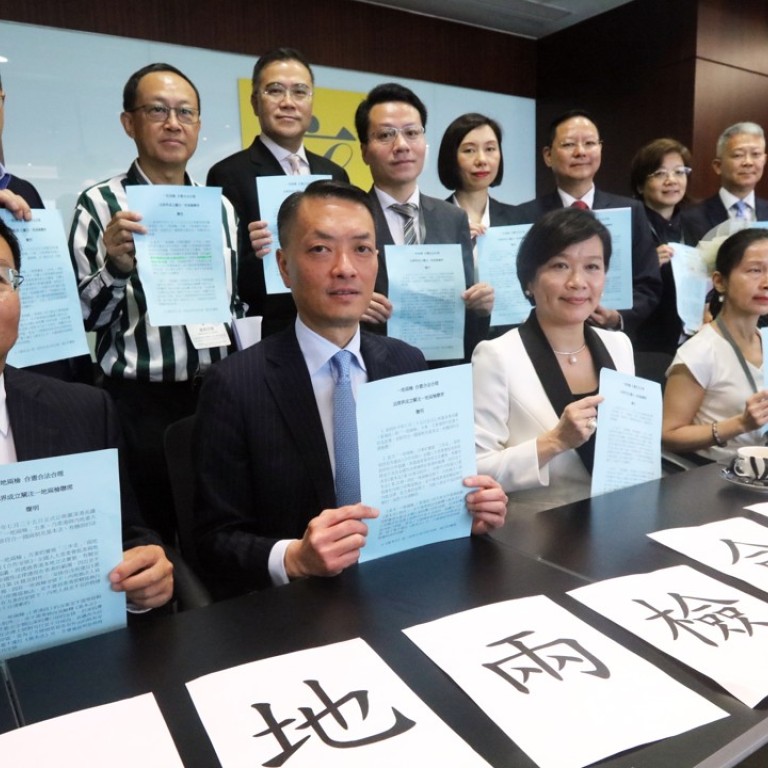
Third concern group set up on Hong Kong’s controversial border plan for China rail line; coalition insists it is legal
Experts join pro-government legislators in coalition favouring plan to have mainland Chinese laws enforced inside local station
More than 20 legal experts and pro-government legislators have launched a coalition in support of a controversial plan to have mainland Chinese laws enforced at the Hong Kong end of a new high-speed rail link to Guangzhou.
It is the third concern group to be set up on the issue as both sides of Hong Kong’s political divide mobilise campaigns for and against the proposal for joint immigration and customs checks in the city.
The new group on Tuesday argued it was lawful for the Hong Kong government to lease a quarter of the rail terminal in west Kowloon to mainland authorities, and said it was “misleading” for the city’s opposition pan-democrat lawmakers to describe the plan as “ceding land” to the mainland.
Hongkongers are ‘calm’ about joint checkpoint plan for high-speed rail terminal, top Chinese official says
Last month the government announced that when the HK$84.4 billion railway is up and running in the third quarter of next year, mainland officers will operate in a port area that the central government will lease from the local government.
Within that space they will exercise almost full jurisdiction.
Under the Basic Law, Hong Kong’s mini-constitution, the city cannot lease land in such a manner, so it will seek permission from the National People’s Congress Standing Committee, China’s top lawmaking body, to allow it to do so. Article 20 of the Basic Law allows Beijing to grant Hong Kong that power.
Transport and justice chiefs strike out at criticisms of plan to put Chinese officials in Hong Kong’s high-speed rail terminus
Pan-democrats have joined forces with more than 90 organisations and individuals to form a concern group against the joint checkpoint plan, and have launched a signature campaign. On Monday, about 20 pro-establishment business groups in Hong Kong set up a coalition to support the so-called “co-location” arrangement.
Announcing the newest group on Tuesday, legislator and City University law professor Dr Priscilla Leung Mei-fun said its members would explain to the public that the joint checkpoint plan was lawful.

“We may be collecting signatures in the legal sector, but we don’t have any plan to do so among the public yet,” Leung said.
Gu Minkang, also a law professor at City University, said: “It was legally groundless for people to accuse the government of ‘ceding land’ to the mainland. Under Article 7 of the Basic Law, land in Hong Kong is owned by the state, and the local government only has the power to manage and use it.
“It was unacceptable for people to mislead the public and politicise an economic issue.”
Hong Kong justice minister vows to hear public opinion on allowing mainland law officials at high-speed rail link
The rail line to the southern Chinese city of Guangzhou will connect Hong Kong to the country’s growing high-speed rail network. The arrangements for border checks between the mainland and Hong Kong have proved a sticking point as officials work to ensure passengers need not go through two separate procedures or get off trains mid-journey.
Local solicitor Francis Chong Wing-charn warned it would be Hong Kong’s loss if the joint checkpoint arrangement got blocked in the city’s legislature.
“It was the local government’s wish that a mainland port area be set up at the West Kowloon terminus, and that the central government would cooperate. How can that be compromising the city’s high degree of autonomy?” Chong said.
Five pro-establishment lawmakers have joined the coalition.
Speaking separately on Monday, Kevin Yam Kin-fung, convenor of the Progressive Lawyers Group, said the Hong Kong government’s decision to use Article 20 of the Basic Law to lease land to mainland authorities could set a dangerous precedent.
“The use of Article 20 in this way could potentially give Beijing more powers to bypass other Basic Law provisions in future,” he said. “The legal uncertainty could hamper the city’s business environment.”
Additional reporting by Jeffie Lam

